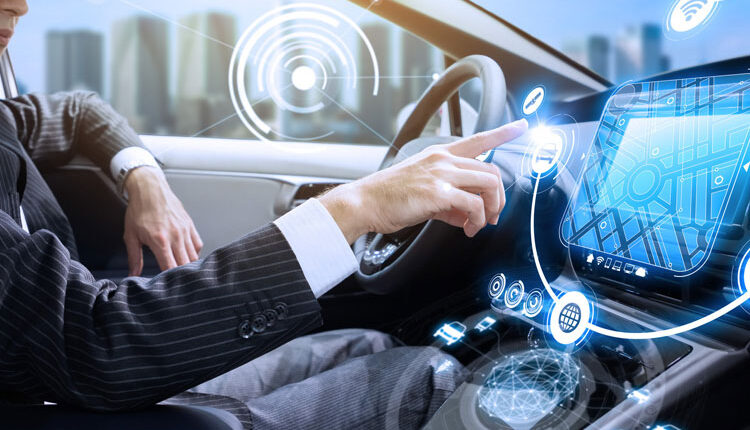Artificial intelligence (AI) plays a significant role in the automotive industry, revolutionizing various aspects of vehicle development, manufacturing, and driving experiences.
The Age of AI Has Arrived & Here’s How it Promises to Revolutionize Automobiles
Here are some key areas where AI is making an impact:
Autonomous Driving:
AI is at the core of autonomous driving technology. Self-driving cars rely on AI algorithms to process vast amounts of data from sensors, cameras, and radar systems to make real-time decisions on navigation, object detection, and collision avoidance.
Advanced Driver Assistance Systems (ADAS):
AI powers ADAS features such as adaptive cruise control, lane-keeping assist, and automatic emergency braking. These systems use AI algorithms to analyze sensor data and assist drivers in maintaining safety and enhancing convenience.
Natural Language Processing (NLP):
AI-powered NLP enables voice-activated assistants in vehicles, such as Apple’s Siri or Google Assistant. Drivers can interact with these systems to perform tasks like making calls, sending messages, or controlling in-car features without taking their hands off the steering wheel.
Predictive Maintenance:
AI algorithms analyze vehicle sensor data to predict potential failures or maintenance needs. By monitoring various parameters, such as engine performance or tire wear, AI can detect anomalies and provide early warnings, allowing for proactive maintenance and reducing downtime.
Manufacturing and Supply Chain Optimization:
AI is used to optimize manufacturing processes in automotive plants. It can help analyze production data, predict maintenance needs for machinery, and improve overall efficiency. AI is also applied in supply chain management to optimize logistics, demand forecasting, and inventory management.
Virtual Assistants and Infotainment:
AI-based virtual assistants, like Amazon’s Alexa or BMW’s Intelligent Personal Assistant, provide drivers and passengers with personalized experiences. They can provide real-time traffic updates, weather forecasts, play music, suggest restaurants, and even control smart home devices.
Customer Experience and Personalization:
AI is employed to analyze customer data and preferences, enabling automakers to offer personalized recommendations and services. It helps in understanding consumer behavior, improving marketing strategies, and enhancing the overall customer experience.
Autonomous Vehicles:
AI is essential for developing self-driving cars. It enables vehicles to perceive their environment using sensors like cameras, LiDAR, and radar, and make intelligent decisions based on the data collected. Machine learning algorithms help autonomous vehicles recognize objects, interpret road signs, navigate complex traffic situations, and adapt to changing road conditions.
Predictive Maintenance:
AI is used to monitor vehicle performance and predict maintenance needs. By analyzing data from various sensors, AI algorithms can identify patterns, detect anomalies, and provide timely maintenance recommendations, reducing breakdowns and improving vehicle reliability.
Enhanced Infotainment Systems:
AI technologies enhance in-car infotainment systems by personalizing the user experience, recommending music or content based on preferences, and providing real-time traffic updates or weather information. AI algorithms can also analyze driver behavior to offer personalized suggestions and alerts for safe driving.
Data Analysis and Analytics:
With the increasing connectivity of vehicles, vast amounts of data are generated. AI enables automakers to analyze this data to gain insights into customer behavior, driving patterns, and vehicle performance. These insights can be used to develop new features, improve vehicle design, and provide personalized services.
Cybersecurity:
AI helps in detecting and preventing cyber threats in connected vehicles. It can identify abnormal patterns in network traffic, detect potential intrusions, and protect vehicle systems from unauthorized access, ensuring the security and integrity of vehicle data.
Overall, AI is transforming the automotive industry by enabling safer, more efficient, and connected vehicles. It enhances the driving experience, improves vehicle performance, and paves the way for the future of autonomous mobility.
Global Automotive Artificial Intelligence Market to Reach $14.8 Billion by 2030*
Many automotive manufacturers have embraced AI technology to some extent, but the specific implementation and adoption of AI vary across companies. Some prominent automotive manufacturers that have incorporated AI into their operations include:
- Tesla: Tesla has been at the forefront of AI adoption in the automotive industry. Their vehicles utilize AI for autonomous driving features, such as Autopilot, which leverages sensors and AI algorithms to enable advanced driver assistance and semi-autonomous capabilities.
- General Motors: General Motors (GM) has heavily invested in AI and autonomous driving technology. They acquired Cruise Automation, a self-driving technology company, and are actively developing their self-driving vehicle platform, which relies on AI for perception, decision-making, and control.
- Ford: Ford has been actively exploring the integration of AI in their vehicles. They have partnered with AI companies like Argo AI to develop autonomous driving technology and are incorporating AI-based driver assistance features in their models.
- BMW: BMW has been working on integrating AI into their vehicles for various purposes. They have developed the BMW Intelligent Personal Assistant, an AI-powered virtual assistant that responds to voice commands and assists drivers with various functions.
- Toyota: Toyota has been incorporating AI into their vehicles to improve safety and efficiency. They have developed the Toyota Guardian system, which uses AI algorithms to provide driver assistance and enhance vehicle safety.
- Honda: Honda has been exploring AI technologies for their vehicles. They have developed the Honda Sensing suite, which includes AI-powered features like collision mitigation braking and adaptive cruise control to enhance driver safety.
- Audi: Audi has integrated AI technologies into their vehicles to enhance driver assistance and infotainment systems. Their AI-powered features include adaptive cruise control, traffic jam assist, and natural language processing for voice commands.
These are just a few examples, and many other automotive manufacturers are actively leveraging AI technology to improve their vehicles’ capabilities, safety, and user experience. The adoption of AI varies across manufacturers, and each company may have different approaches and levels of AI implementation based on their specific strategies and technological advancements.
*SOURCE Research and Markets


